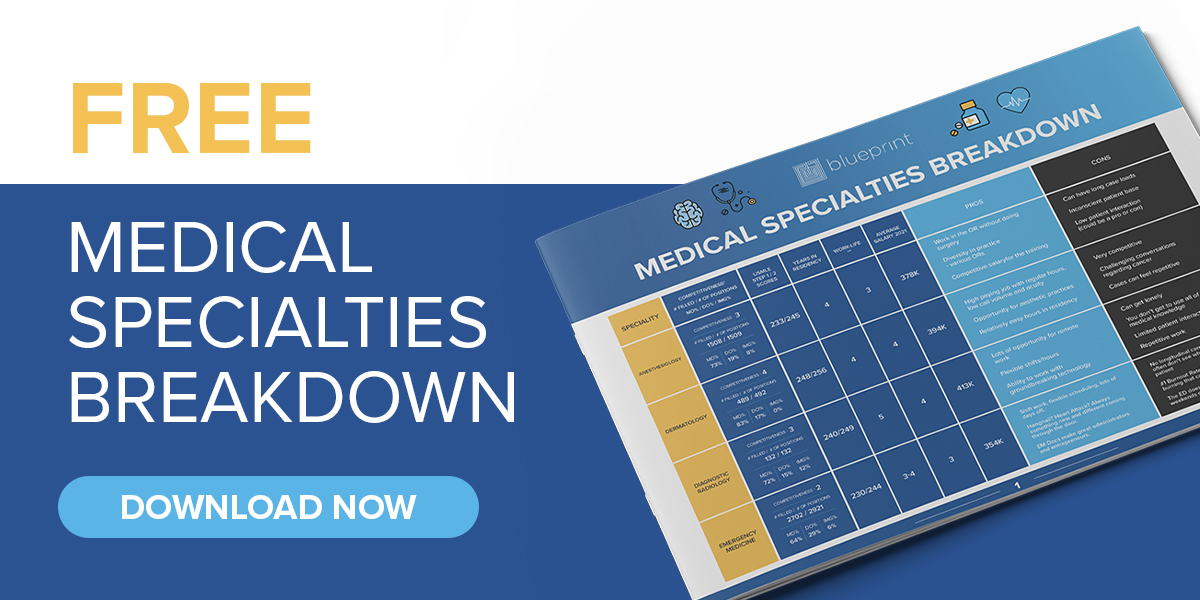I did everything they told me to do. The brilliant, high-achieving upperclassmen who were matching into competitive specialties because of their sky-high USMLE scores had given me the non-secret of how to ace boards.
Turns out, it was the same guidance that any “How to score high on USMLE Step 1” Google search would have provided: do lots of questions, build a study calendar, put away distractions, take practice tests, and come out firing on test day. (Mind you, this was back in the days of Step 1 being scored.)
I stuck to the plan, and was pleased when I scored higher than I ever hoped to. By scoring high enough, no specialty would be off the table, and I could, in essence, match into any specialty I chose. Doing well on USMLE Step 1 made me feel like I was in control of my destiny, and that I’d jumped over a large hurdle in figuring out my path forward in life.
On Choosing the Medical Specialty You Love
But with that freedom came the burden of having to choose, and now I arrived at the next crossroad: picking a specialty to go into. What would I do?
I simply didn’t know. I dabbled in everything, exploring shadowing opportunities across multiple surgical subspecialties whenever possible.
My mentor was an otolaryngologist. He was the kind of attending who had 30 hours in his day, and could manage a busy clinic while giving each patient his full attention, then pop into scrubs to perform procedures in the OR, only to flip back into his suit and meet with students to help them get their careers started on the right foot.
I followed him around in the OR, and while he inspired me personally, the procedures just didn’t resonate with me. The complex skull base surgery just looked like pink caves on a screen to me, and I couldn’t foresee it as a tenable future, at least for me.
I can still hear his voice when he learned I wasn’t going to apply to match into ENT, but rather, anesthesia. “You must really, really love [anesthesiology],” he conceded. And I did. I loved everything about the field and had decided that I wanted to be an anesthesiologist.
The Power of Pursuing Happiness Over Prestige
How did I decide to be an anesthesiologist? An important factor was the personality of the attendings and residents that I met in the anesthesia world. Our outlooks and viewpoints gelled, and this has been the case during all the different anesthesia venues of medical school, residency, and practice.
Although it was the field I liked best, it almost came as a surprise to some that I was pursuing anesthesia—I heard things like, “You are more competitive than that! You can make more money elsewhere! You can take less call. Look at all the respect that you’d get as a surgeon/orthopedist/cardiologist!”
But the voices that rang most true were the ones that said, “Just do what you like best. The money would come in time, regardless of field, call will be call, and if you want to have a long, fruitful, and satisfying career, you have to do what you love.”
So, although it was difficult, I had to ignore the people that told me, “Your scores are too good for that specialty.”
I’ve been in practice as an attending for over three years now, and although this still might be a honeymoon period, I’m sure I made the right decision. Most days are still fun, and I appreciate everything that drew me to the field.
4 Things to Remember When it Comes to Choosing a Specialty
Alright, so what is some actionable advice you can glean from my story? Here’s four things I’d like you to keep in mind.
If you’re still in the early stages of deciding your specialty and are looking for a side-by-side comparison, check out this FREE Medical Specialties Breakdown Guide with insights from the experts who have been in your shoes!
1. Utilize any opportunity to explore specialties of interest.
It’s hard to find the time and energy to send out emails, make requests, and schedule opportunities to merely watch other people do their jobs. Some attendings love having medical students shadow and will invite you to be part of the team. Others will put you in the corner and remind you that “shadows don’t make noise” if you ask a question.
Nonetheless, observing a particular doctor over the course of a few days is the best way to see what their day-to-day life is like.
2. You have to do what you love.
Somehow you chose medicine, based on some guidance, advice, experience in the field, and the semblance of an idea of what you think a doctor does. If you live, breathe, and sleep orthopedics, put the totality of yourself into getting great scores, finding mentors in the field, and getting your foot in the door.
But my advice is only do all of that if you love orthopedics. If you don’t, don’t do it! Do what you love instead.
3. Let the day-to-day be your guide.
Don’t make the mistake of going into a field because you love “the science behind it.” You have to make sure you enjoy what day-to-day life is like in that specialty. For instance, if you think that neural pathways are super cool and love “localizing the lesion” in question stems, but can’t stand being in clinic, doing neuro exams, and reading MRIs, then neurology may not be the place for you.
Place more emphasis on the practical aspects of the job, more than the underlying science and textbook material behind it.
4. Don’t let your grades and scores dictate your future.
This one works in both directions. If you want to match into something very competitive, you need a very competitive residency application.
Realize this from the get-go. Study hard, go to office hours, find a tutor, and do great in whatever you are doing right now. Excel in class and excel on tests. But don’t let a low mark hold you back. Also, if you have a higher test score, you don’t have to try and match into the most competitive speciality. As above, do what you love.
Further Reading
When you’re deciding which specialty you’d like to match into, it’s important to listen to yourself. Follow your passion, and don’t worry too much about what other people think. At the end of the day, doing what feels right for you will always pay dividends.
For more (free!) insight from Blueprint tutors, check out these other posts on the Med School blog:






